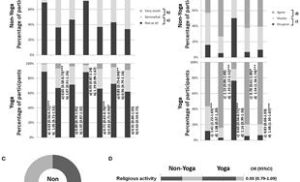Reducing Burnout Risk By 45%: Mindful Self-Care For Professionals
In today’s fast-paced world, professionals are constantly pushing themselves to meet goals and deadlines, often neglecting their own well-being in the process. However, there is a solution that can significantly reduce the risk of burnout by 45%: mindful self-care. By prioritizing self-care practices and being present in the moment, professionals can achieve a much-needed balance between work and their personal lives. In this article, we will explore the importance of mindful self-care and how it can positively impact professionals’ mental and emotional health. So, if you’re ready to discover the key to reducing burnout and finding harmony in your professional life, keep reading!
Introduction
Welcome to this comprehensive article on addressing burnout and practicing mindful self-care for professionals. Burnout is a growing concern in today’s fast-paced and demanding work environments, and it can have a significant impact on both our physical and mental well-being. In this article, we will explore the definition and causes of burnout, understand its impact on professionals, and delve into the importance of self-care as a means to prevent and manage burnout. We will specifically focus on the practice of mindfulness as a powerful self-care tool and discuss strategies for implementing mindfulness into your daily routine. Additionally, we will explore the importance of work-life balance, building a support system, managing stress and resilience, and knowing when to seek professional help. By the end of this article, you will have gained valuable insights and practical strategies to help you reduce burnout and cultivate a greater sense of well-being in your professional life.
Understanding Burnout
Definition of Burnout
Burnout is a state of chronic physical and emotional exhaustion that is often accompanied by feelings of cynicism and detachment from work. It is the result of prolonged exposure to stressors and can occur when an individual feels overwhelmed, emotionally drained, and unable to meet the demands of their job. Burnout is not simply a temporary state of feeling tired or stressed; it is a more severe condition that can have long-term consequences if left unaddressed. It can impact various aspects of a person’s life, including their physical health, mental well-being, and overall job performance.
Causes of Burnout
Burnout can be caused by a combination of factors, both personal and work-related. Some common causes include excessive workload, lack of control over one’s job, insufficient support from colleagues or superiors, and a lack of work-life balance. High-pressure professions, such as healthcare, education, and finance, are particularly susceptible to burnout due to the demands and expectations placed on individuals in these fields. Other factors, such as a perfectionist mindset, a lack of job satisfaction, and poor work environment, can also contribute to the development of burnout. It is important to recognize and address these causes to effectively prevent and manage burnout.
The Impact of Burnout on Professionals
Physical Effects of Burnout
Burnout can manifest in various physical symptoms that can significantly impact an individual’s overall well-being. Physical effects may include chronic fatigue, insomnia, changes in appetite, headaches, gastrointestinal issues, and weakened immune function. Prolonged exposure to stress and exhaustion can take a toll on the body, leading to an increased risk of developing chronic health conditions such as cardiovascular diseases, musculoskeletal disorders, and compromised immune function.
Mental and Emotional Effects of Burnout
In addition to the physical toll, burnout can also have significant mental and emotional effects. Individuals experiencing burnout may feel a sense of detachment or cynicism towards their work, leading to decreased job satisfaction and performance. They may also experience emotional exhaustion, feelings of depersonalization, and a reduced sense of personal accomplishment. Burnout can lead to increased levels of anxiety, depression, and decreased overall mental well-being. It can also affect personal relationships, as individuals may struggle to find the energy and emotional capacity to engage fully outside of work.
The Importance of Self-Care
Definition of Self-Care
Self-care refers to the intentional actions and practices that individuals engage in to nurture their physical, mental, and emotional well-being. It involves prioritizing one’s needs, setting boundaries, and engaging in activities that promote relaxation, rejuvenation, and a sense of fulfillment. Self-care is essential for professionals to maintain their overall health and prevent burnout. It is not a luxury but a necessity in today’s demanding work environments. By incorporating self-care practices into our daily routines, we can better manage stress, enhance our resilience, and improve our overall job performance.
Benefits of Self-Care for Professionals
Engaging in regular self-care activities has numerous benefits for professionals. Firstly, self-care helps to reduce stress levels and promote relaxation, allowing individuals to recharge and replenish their energy reserves. It also contributes to increased emotional well-being, helping individuals to manage and regulate their emotions more effectively. Self-care practices can enhance job satisfaction, as they provide opportunities to nurture personal interests and hobbies outside of work. Additionally, self-care promotes physical health by encouraging individuals to engage in activities such as exercise, proper nutrition, and adequate rest. By prioritizing self-care, professionals can create a more balanced and fulfilling life, reducing the risk of burnout and enhancing their overall sense of well-being.
Mindfulness as a Self-Care Practice
Introduction to Mindfulness
Mindfulness is the practice of intentionally bringing one’s attention to the present moment without judgment. It involves cultivating an awareness and acceptance of one’s thoughts, emotions, and bodily sensations. Mindfulness is a powerful self-care tool that can help professionals manage stress, reduce burnout, and improve overall well-being. By practicing mindfulness, individuals can develop a greater sense of self-awareness, emotional regulation, and resilience in the face of workplace challenges.
Benefits of Mindfulness for Reducing Burnout
Engaging in regular mindfulness practices can have a profound impact on reducing burnout in professionals. Mindfulness helps individuals become more attuned to their stress levels, allowing them to recognize and address burnout warning signs earlier. By increasing self-awareness, individuals can develop a greater understanding of their thoughts, emotions, and reactions to stress, leading to improved emotional regulation. Mindfulness also promotes a sense of calm and relaxation, helping individuals to manage stress more effectively. Research has shown that mindfulness can reduce symptoms of burnout, improve job satisfaction, and enhance overall mental well-being. By integrating mindfulness into their self-care routine, professionals can strengthen their resilience and better navigate the challenges of the workplace.
Implementing Mindful Self-Care Strategies
Creating a Self-Care Routine
To effectively implement mindful self-care strategies, it is important to create a dedicated self-care routine. Begin by identifying activities that bring you joy, relaxation, and a sense of fulfillment. These activities may include meditation, yoga, journaling, engaging in creative pursuits, or spending time in nature. Set aside regular time each day or week to engage in these activities and make them a priority in your schedule. Incorporate mindfulness practices into your self-care routine, such as mindful breathing, body scans, or guided meditations. By creating a consistent self-care routine, you can ensure that self-care becomes an integral part of your daily life.
Developing Mindfulness Habits
In addition to a self-care routine, it is beneficial to develop mindfulness habits throughout your day. Start by bringing your attention to the present moment during routine activities such as eating, walking, or commuting. Engage your senses and notice the details of your surroundings. Practice mindful breathing throughout the day, noticing the sensation of the breath entering and leaving your body. Set reminders on your phone or computer to take short mindfulness breaks, allowing yourself to pause and refocus on the present moment. By weaving mindfulness into your daily activities, you can cultivate a greater sense of presence and reduce stress throughout your day.
Prioritizing Work-Life Balance
Setting Boundaries
Creating a healthy work-life balance is essential for preventing burnout. Start by setting clear boundaries between work and personal life. Establish designated times for work and honor them by avoiding unnecessary overtime or work-related activities during personal time. Communicate your boundaries to colleagues and supervisors, advocating for yourself and your well-being. Disconnect from work-related technology or notifications during non-work hours to create a clear separation between professional and personal life. Setting boundaries allows for greater balance, reduces the risk of burnout, and promotes overall well-being.
Time Management Strategies
Effective time management is crucial for maintaining work-life balance and preventing burnout. Prioritize your tasks and allocate time for each activity based on its importance and urgency. Break larger tasks into smaller, manageable chunks, and set realistic deadlines for completion. Learn to delegate tasks or ask for help when needed, recognizing that you don’t have to do everything on your own. Avoid multitasking and instead focus on one task at a time, allowing for greater efficiency and quality of work. By managing your time effectively, you can create a more balanced schedule, reduce stress, and maintain a healthier work-life integration.
Building a Support System
Importance of Social Support
Building a strong support system is crucial for professionals in managing and preventing burnout. Social support provides a sense of belonging, understanding, and validation, which can help individuals navigate the challenges of their professional lives. Colleagues, friends, and loved ones can offer emotional support and practical advice, helping to alleviate stress and feelings of isolation. Social connections also provide opportunities for relaxation, enjoyment, and shared experiences outside of work, promoting overall well-being. By cultivating a strong support system, professionals can find solace, encouragement, and perspective in times of stress and prevent burnout.
Identifying and Seeking Support
Identifying and seeking support is key to building a robust support system. Reflect on your existing relationships and identify individuals who you trust and feel comfortable opening up to. Reach out to colleagues, friends, or family members to initiate conversations about your work-related challenges or stressors. Be authentic and vulnerable in expressing your feelings and ask for their support or guidance. Consider joining professional networks, support groups, or seeking out mentors who can offer valuable insights and advice. By actively seeking support, you can strengthen your connections and gain invaluable resources for managing and preventing burnout.
Managing Stress and Resilience
Stress Management Techniques
Effective stress management techniques are essential for professionals in mitigating the risk of burnout. Find stress management techniques that work for you, as everyone’s preferences and coping mechanisms may vary. Consider engaging in regular physical exercise, as it releases endorphins and helps to reduce stress. Practice relaxation techniques such as deep breathing exercises, progressive muscle relaxation, or listening to calming music. Incorporate enjoyable activities into your routine, such as hobbies, spending time with loved ones, or engaging in creative pursuits. Prioritize self-care practices that promote relaxation and rejuvenation, such as taking regular breaks, getting enough sleep, and maintaining a healthy lifestyle. By actively managing stress, professionals can minimize burnout risk and maintain emotional well-being.
Building Resilience Skills
Resilience refers to the ability to bounce back from adversity and adapt to challenging situations. Developing resilience skills is vital for professionals in navigating the ups and downs of their careers and preventing burnout. Cultivate a growth mindset, focusing on the lessons learned from setbacks rather than fixating on failures. Practice self-compassion, treating yourself with kindness and understanding during difficult times. Build a strong support system, as social connections provide valuable support and encouragement in times of stress. Develop problem-solving and decision-making skills, enhancing your ability to manage and overcome obstacles. By building resilience skills, professionals can develop a greater capacity to handle workplace stressors and maintain their well-being.
Seeking Professional Help
Knowing When to Seek Help
Recognizing when to seek professional help is an essential aspect of managing burnout. It is normal to experience periods of stress and fatigue in our professional lives, but when these feelings become persistent and overwhelming, it may be time to reach out for assistance. Signs that it may be beneficial to seek professional help include chronic exhaustion, persistent feelings of sadness or hopelessness, difficulty concentrating, changes in appetite or sleep patterns, and a significant decline in job performance. If you notice any of these symptoms or feel that your well-being is significantly impacted, it is important to consult with a mental health professional who can provide guidance and support.
Therapeutic Options for Burnout
Various therapeutic options are available to professionals experiencing burnout. Psychotherapy, such as cognitive-behavioral therapy (CBT), can help individuals explore the underlying causes of burnout, develop healthy coping mechanisms, and cultivate resilience. Mindfulness-based stress reduction (MBSR) programs can also be beneficial, as they incorporate mindfulness practices to reduce stress and enhance overall well-being. In some cases, medication may be prescribed to help manage the symptoms of burnout, particularly if depressive or anxiety disorders are present. It is important to work with a healthcare professional to determine the most appropriate therapeutic option based on your individual needs. Seeking professional help is a proactive step towards managing burnout and improving your overall quality of life.
In conclusion, burnout is a serious concern for professionals, but by incorporating mindful self-care strategies, a balanced work-life routine, building a support system, managing stress and resilience, and knowing when to seek help, it is possible to reduce burnout risk and cultivate a greater sense of well-being. By practicing regular self-care, prioritizing mindful practices, and engaging in a holistic approach to well-being, professionals can create a healthier and more fulfilling professional life. Remember, you are not alone in this journey, and it is never too late to prioritize your well-being. Embrace the power of mindful self-care and take the necessary steps towards reducing burnout and living a more balanced and joyful professional life.
















